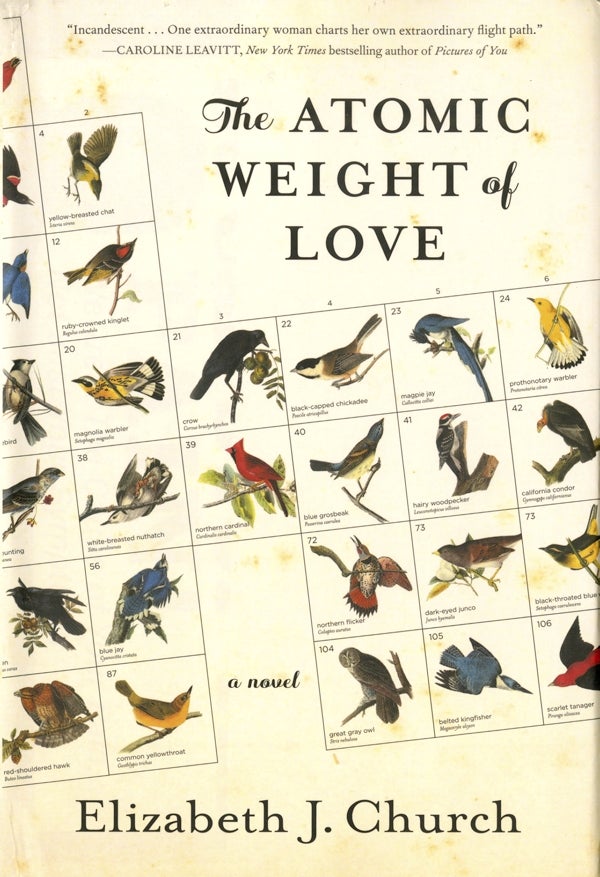It’s never too late to spread your wings
Published 12:00 am Sunday, July 3, 2016
“The Atomic Weight of Love,” by Elizabeth J. Church. Algonquin Books of Chapel Hill. 2016. 333 pp.
By Deirdre Parker Smith
deirdre.smith@salisburypost.com
Please read “The Atomic Weight of Love.”
Author Elizabeth J. Church sets the right tone for this story of love, science and changing social mores. Her Meridien Wallace character evolves during the decades the book covers, and in doing so, reveals the struggles of women who came of age in the 40s and 50s, and how their lives began to change in the tumultuous 1960s and 70s.
Church uses Meridien to show the reader how a bright young woman yearned to continue her education, be a scientist and have a place in the world, only to be shoved aside by her brilliant husband, the man she married for his intellect.
The intellect of her college professor is not enough to sustain her. She wants more and he constantly questions what she wants and why.
Alden Whetstone loves her, but only in a prescribed way. Twenty years her senior, his idea of a wife is limited to the traditional roles. Once deeply involved in his secret work at Los Alamos, which he cannot talk about, he fails to share anything with her about his life or his thoughts.
He denies her the chance to continue her education as an ornithologist, telling her she should settle for a baby, or work in a lab, instead. He expects her to be the perfect 1950 housewife, who asks no harder question than “What would you like for dinner?”
He stifles Meridien, crushes her dreams without a thought, scolds her like a child, destroys any attempts she makes to get them more involved. There are few outings, little discussion of any topic and an attitude that Meridien should shut up and be satisfied. The reason she fell in love with him, their deep, thoughtful conversations, evaporates as they argue about her isolation and his sense of importance.
Trying to keep her mind active, she returns to her bird studies, observing her favorite crows, and there meets Clay, the love of her life, 20 years younger, but aged by a tour of duty in Vietnam during which his best friend is blown to bits.
Where Clay is a well-educated, geologist-hippie preaching freedom, peace and love, it is hard for Meridien to let go of the strict boundaries of her life. Clay opens up worlds for her, satisfies the ache deep inside her, brings her back to life.
While their relationship is freeing and soaring, her relationship with Alden is stultifying. We see how Meridien changes over time, how she endures the death of her beloved mother, the shocking death of her best friend, the loss of her ambition, and how she fights back, in small ways at first, but then with a plan and determination.
It is a story of many kinds of love and intellect.
It portrays women of the 1950s and 1960s, and how many with bright futures acquiesced to their husbands, sublimating themselves. It’s also about women who won’t settle. It’s about war and peace, about the huge change in America during and after the Vietnam War.
While it’s full of despair and frustration, it is also full of joy and possibilities, of successes that make up for earlier failures.
Maybe a 20-something cannot fully appreciate the book, but to women of a certain age, it is a chronicle of their lives, their America. The fight for rights and recognition did matter, still does matter.
And it shows that love matters; that women can be intelligent and ambitious and still need love, support and understanding.
With the crows as metaphor for her life, Meridien wants to soar. She observes their daily struggles, their personalities and behaviors. Even though she knows, deep down, that a future with Clay is unlikely, she celebrates each moment when she’s free of constraints, and can express herself in different ways.
She learns to draw and paint, she finds new friends and a purpose through a discussion group that’s not about gelatin salads and baby pictures. And yet, in the house with Alden, she’s still an object. He never tries to understand what she wants or how she feels. Because that’s the way it’s always been.
The way these plotlines evolve is true enough. Meridien still feels responsibility for Alden. Clay is ready to break her free. Events occur that cloud all the issues she’s become clear about, and life changes, again.
What seems like a sad end is the beginning of another new Meridien, another challenge, goals and plans. Purpose and calling come into play.
This book is ideal for wide ranging discussions about men’s and women’s roles, about education and opportunity and the great shift of culture in the 1960s and 70s.
Author Elizabeth J. Church has great storytelling skills. Her prose is at times poetic, but clear as a New Mexico blue sky. She grew up in Los Alamos, her father a chemist, her mother a biologist. This is not their story, but it is the story of others in that secretive community. Church was a lawyer for 30 years, until an event proved to her that life is short and she pursued her dream of writing.
We should be glad of that. Her authenticity is obvious, and her way with words captivating.



